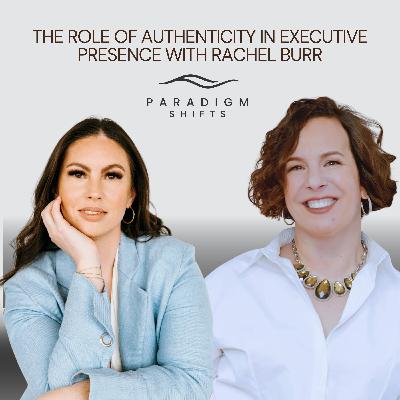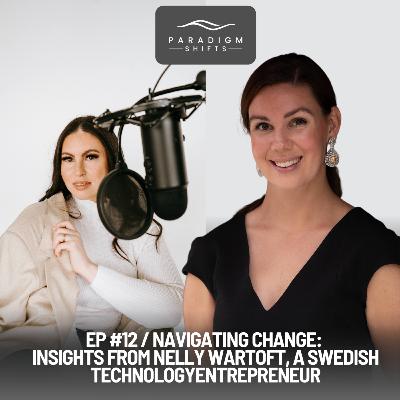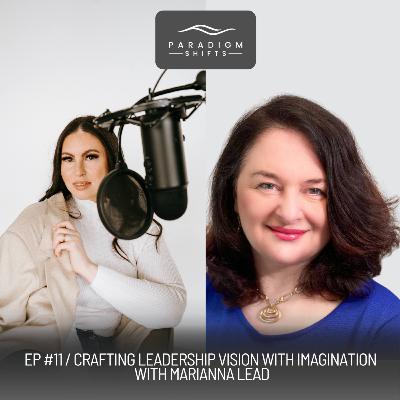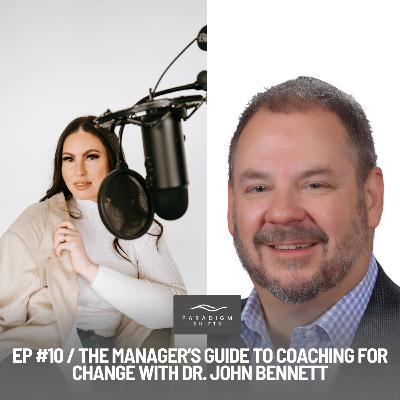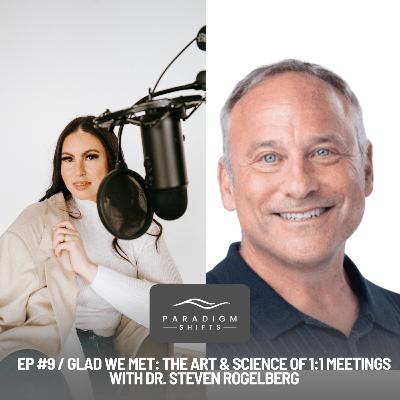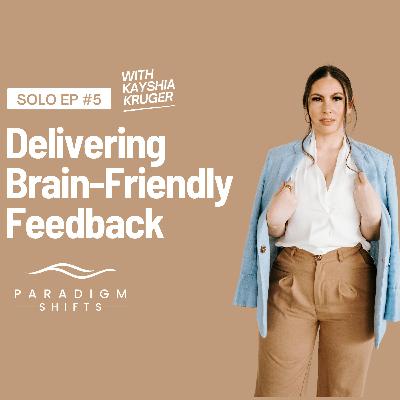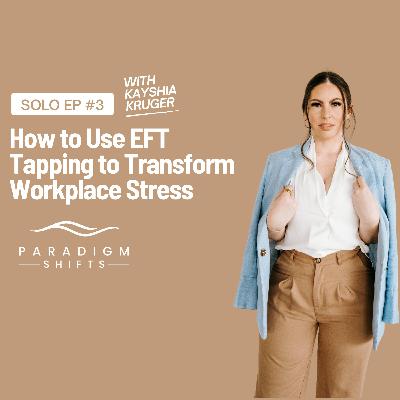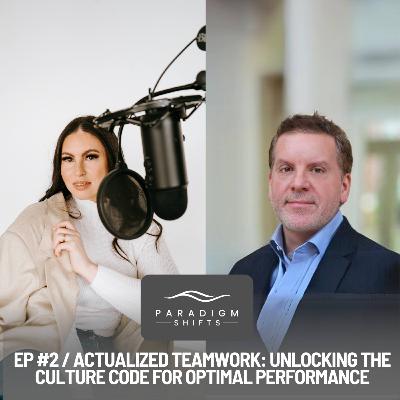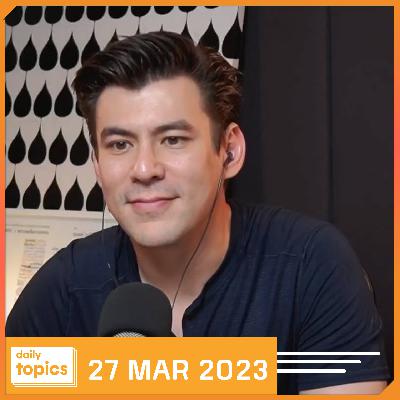Discover Paradigm Shifts Podcast
Paradigm Shifts Podcast

Paradigm Shifts Podcast
Author: Kayshia Kruger
Subscribed: 3Played: 17Subscribe
Share
© 2022 Paradigm Shifts Podcast
Description
Thanks for tuning in to the Paradigm Shifts podcast with your host, Kayshia Kruger. I’m an organization development practitioner and executive coach working with leaders to create positive changes in the workplace using behavioral science. My personal mission? Share science-based tools and leadership insights from the field that you can use in your workplace and beyond. Considering we spend about ¾ of our lifetime at work, there is incredible science in organizational psychology that can be used to rethink the way we work, lead, and ultimately live. Join me, as I talk with thought leaders and business leaders in practice, unpacking light bulb moments for paradigm shifts.
43 Episodes
Reverse
In this episode of the Paradigm Shifts podcast, Kayshia and Rachel Burr delve into the concept of authenticity in leadership. They explore how leaders can connect with their true selves, the importance of boundaries, and the role of empathy and executive presence. The conversation emphasizes the need for self-reflection, feedback, and adaptability as leaders grow and face challenges. Rachel shares insights on navigating change, the impact of vulnerability, and actionable steps for leaders to enhance their authenticity and presence.
Connect with Rachael: https://www.linkedin.com/in/rachelmburr/
Buy/Read her Book: https://butterflygoobook.net/
Meet Rachel – The People Leadership Expert
Rachel is a seasoned leadership coach and organizational development expert who helps brilliant business leaders master the people side of leadership. With over 20 years of corporate and consulting experience, she works with executives, team leaders, and business owners to elevate their leadership impact, improve team dynamics, and drive organizational success.
Armed with master’s degrees in psychology and organizational development, Rachel brings deep insights into human behavior, team effectiveness, and leadership strategy. She has worked with leaders and teams across industries and around the globe, helping them navigate complex business environments with confidence and clarity.
Rachel partners with corporate executives, HR professionals, and talent development leaders to transform leadership at all levels. Whether working with senior leaders, startup founders, or high-potential managers, her coaching helps leaders: ✅ Develop stronger, more engaged teams ✅ Master delegation to focus on strategy ✅ Enhance influence and impact across the organization ✅ Shift from managing individuals to leading other leaders
Rachel’s approach is a powerful blend of empathy and analytics—listening deeply, asking the right questions, and using qualitative and quantitative insights to create meaningful change. As one client put it, “Rachel opened my eyes to my own capabilities, helping me tackle challenges I never thought I could. She is wise, direct, and incredibly insightful.”
She believes leadership isn’t about creating carbon copies of yourself—it’s about unlocking the full potential of your team. If you’re a leader looking to better leverage your leadership capacity, improve collaboration, and drive real results, Rachel is the coach you need.
📩 Connect with Rachel: Rachel@Catamentum.com
In this episode, Kayshia and Nelly Wartoft discuss the complexities of change management from multiple perspectives: executives, middle managers, and employees. They explore the activation gap in change initiatives, the importance of effective communication, and the role of technology in facilitating change. Nelly shares insights on how to bridge the gap between intention and impact, emphasizing the need for transparency and humanity in leadership. The conversation also addresses the challenges faced by middle managers and the significance of understanding change resistance as a natural response. Takeaways ✨ There is a significant activation gap in change management. ✨ Change fatigue among employees has drastically increased. ✨ Executives need to prioritize better and manage change activation effectively. ✨ Technology can automate and enhance change communication. ✨ Middle managers play a crucial role in translating executive vision to action. ✨ Transparency and authenticity are essential for employee trust. ✨ Change resistance is a natural human reaction, not a personal attack. ✨ Leaders should not take change resistance personally. ✨ Effective communication can significantly improve change buy-in. ✨ Personalized communication is key to successful change management. About the Guest Nellie Wartoft is a Swedish technology entrepreneur who launched Tigerhall in 2019, revolutionizing how large enterprises engage their organizations to drive change at scale. Under her leadership, Tigerhall has quickly gained traction with global Fortune 500 firms undergoing transformation, and today has users across 32 countries, and employees in 12 markets. Nellie has raised over $10 million in venture capital from visionary investors including Sequoia Capital and Monk's Hill Ventures, and Tigerhall's customers include well-known enterprises in technology, consumer goods, professional services, and financial services. Prior to founding Tigerhall, Nellie was a top biller at Michael Page, where she led the Sales & Marketing practice and saw firsthand the issues in driving organizational engagement around change, and how the technology used in communications, knowledge sharing, change and transformation led to dissatisfaction, more confusion and increased disengagement. Her experience led her to launch Tigerhall, which bridges the gap between how organizations have traditionally shared information and knowledge (think ghost town Sharepoint sites, mass internal email overload and snooze fest town halls), and how people prefer to consume content and interact with each other today (think your internal Spotify, two-way live interactions and the right reinforcement in the right workflow). Nellie has been named on the 2021 Gen T list of Leaders of Tomorrow by Tatler Magazine and was recognized as one of the Top Entrepreneurs to Watch in 2023 by the International Business Times. She was also a Swedish National Champion in skeet shooting and air rifle in her teenage years. Nellie is an accomplished speaker and regularly presents at large events and global forums such as the Global CEO Exchange, Business Transformation Exchange, TEDx events, SaaSTech Asia, SMF, Cornell University and several leadership summits across the United States, Europe and Asia. She currently serves as a non-executive director on the boards of the Swedish Chamber of Commerce Singapore and the SGTech Digital Transformation Chapter - the largest industry association for technology companies in Singapore. Outside of changing the way enterprises drive change, Nellie loves tennis, surfing and electronic house music. She has lived and worked in Singapore, London, Seoul and Los Angeles. www.tigerhall.com
In this episode of the Paradigm Shift podcast, Kayshia and Mariana Lead explore the profound impact of imagination and mental rehearsal on leadership effectiveness. They discuss the importance of authenticity, self-awareness, and positive self-talk in shaping a leader's vision and the culture of their organization. Techniques for understanding personal ideas and the role of expectations in team dynamics are also examined, emphasizing the need for trust and respect within teams. The conversation concludes with actionable strategies for harnessing the mind's power to create success and abundance. Takeaways ✨ Imagination is essential for effective leadership. ✨ A clear vision is necessary for guiding teams. ✨ Authenticity is key to driving success. ✨ Mental rehearsal can aid in decision-making. ✨ Positive self-talk influences outcomes. ✨ Coaching promotes a culture of abundance. ✨ Expectations significantly impact team dynamics. ✨ Trust is foundational for team collaboration. ✨ Respectful neutrality can enhance workplace relationships. ✨ Harnessing the mind's power leads to success. About the Guest Marianna Lead is an internationally recognized Master Certified Coach (MCC) and Portfolio Credentialing Assessor with the International Coach Federation (ICF) as well as the Founder/Executive Director of Goal Imagery® Coaching Academy—a leading global provider of ICF-accredited coach training and mentoring programs. Marianna's popular “Holistic Life, Career & Executive Coach Training™” programs are currently taught online in 6 different languages around the world, and her Academy is one of the only coaching schools worldwide with ICF accreditations for every ICF credential. It was ranked as one of the best coaching schools in the USA by Positive Psychology magazine. Twice-elected President of ICF's flagship NYC chapter, Marianna brings over 20 years of experience in coaching, public speaking, designing, and teaching curriculums. She taught numerous courses at New York University Master's Degree and Coaching Certificate Programs and was the first expert to introduce coaching at the world-renowned Smithsonian Institution. Marianna recently co-authored Me, My Brand and WHY – a Self-Coaching Guide for Building a Personal Brand (available on Amazon) and is writing her next book about coaching mastery. To find out more about Marianna and her school, please visit goalimagery.com
Dr. John Bennett, author of The Manager's Guide to Coaching for Change, discusses his journey to coaching and the importance of coaching for managers. He emphasizes that coaching is a skill that can be learned and developed, and that managers can use coaching to drive individual and organizational change. He introduces a 6-step coaching process and shares real-world examples of how managers have applied coaching models effectively. He also highlights the ethical considerations of managerial coaching and the need for managers to adapt their coaching approaches to diverse teams and cultures.
New Book, The Manager's Guide to Coaching for Change, available on Amazon: https://a.co/d/4SgLBhv Visit https://lawton-associates.com/ or reach out to Dr. John Bennett https://www.linkedin.com/in/john-bennett-phd-976233/
Takeaways
Coaching is a skill that can be learned and developed by managers.
Managers can use coaching to drive individual and organizational change.
A 6-step coaching process can guide effective coaching conversations.
Managers should be aware of the ethical considerations of coaching and adapt their approaches to diverse teams and cultures.
In this conversation, Dr. Steven Rogelberg discusses the importance of one-on-one meetings between managers and their employees. He emphasizes that these meetings are not for the manager, but for the employees to express their challenges and for the manager to provide support. The outcomes of effective one-on-one meetings include increased employee engagement, better team alignment, greater retention, and improved time management. Dr. Rogelberg suggests that the optimal frequency for these meetings is every week or every other week. He also highlights the importance of creating a diverse and personalized agenda for each meeting and allowing the employee to drive the conversation. The location of the meeting can vary based on individual preferences, and both virtual and face-to-face meetings can be effective. Dr. Rogelberg encourages managers to tie their one-on-one strategies to their personal values and involve employees in shaping the meetings to make them more meaningful and impactful.
Takeaways
One-on-one meetings between managers and employees are critical for success and engagement.
These meetings should be focused on the employees' needs and challenges, with the manager providing support.
Effective one-on-one meetings lead to increased employee engagement, better team alignment, and improved retention.
The optimal frequency for these meetings is every week or every other week.
Managers should create a diverse and personalized agenda for each meeting and allow the employee to drive the conversation.
The location of the meeting can vary based on individual preferences, and both virtual and face-to-face meetings can be effective.
Managers should tie their one-on-one strategies to their personal values and involve employees in shaping the meetings.
About Our Guest
For more information about Dr. Steven Rogelberg, you can visit his website at https://www.stevenrogelberg.com/
To order his book, please visit https://a.co/d/36eXh1n
Dr. Steven G. Rogelberg. Dr. Rogelberg is a Chancellor’s Professor at UNC Charlotte, recognized for his distinguished national, international, and interdisciplinary contributions. Known as the 'world’s leading expert on how to fix meetings' by none other than Adam Grant, Dr. Rogelberg has profoundly impacted how organizations operate.
His acclaimed book, 'The Surprising Science of Meetings,' has graced over 25 'best of' lists and was hailed by the Washington Post as the #1 leadership book to watch for. His upcoming release, 'Glad We Met: The Art and Science of 1:1 Meetings,' promises to be transformative, with high praise from thought leaders like Dan Pink.
Dr. Rogelberg's expertise has been sought by major TV networks like CBS and CNN, and he’s been featured in leading publications such as the Wall Street Journal and the New York Times. His keynotes have inspired global audiences at organizations like Google, Amazon, and the United Nations. Beyond academia, he has testified before the US Congress and is a member of the prestigious Marshall Goldsmith 100 Coaches Group.
Summary
In this conversation, Kayshia and Carmen Johnson discuss the quest for success and the unexpected consequences that come with achieving significant goals. Carmen shares her personal experience of feeling empty and unfulfilled after reaching her career goal of becoming a CFO. She realizes that she had neglected other aspects of her life, such as her family and personal relationships.
Carmen goes through a process of self-reflection and reevaluates her goals and priorities, ultimately creating a personal vision centered around empowering and equipping others. She also breaks the cycle of her upbringing and focuses on building meaningful relationships and leaving a positive legacy.
Takeaways
Achieving a significant goal may not always bring the expected feelings of success and fulfillment.
It is important to consider all aspects of life, not just career, when setting goals and pursuing success.
Self-reflection and reevaluation of goals and priorities can lead to a more balanced and fulfilling life.
Building meaningful relationships and leaving a positive legacy are important components of success.Carmen Johnson LinkedIn: https://www.linkedin.com/in/carmen-johnson-6961526/
In this episode, Kayshia Kruger discusses the role of a manager as a coach in an organization. She differentiates between a manager, mentor, consultant, and coach, highlighting their distinct functions. She emphasizes the importance of managers adopting a coaching mindset to foster trust, open communication, and employee engagement. She outlines essential skills for effective coaching, including active listening, powerful questioning, empathy, and providing constructive feedback. Kayshia also provides practical tips for integrating coaching into everyday interactions, such as regular one-on-one meetings, encouraging self-reflection, fostering a culture of continuous feedback, using development plans, and celebrating wins and learning from failures. Takeaways
Managers should adopt a coaching mindset to foster trust, open communication, and employee engagement.
Essential skills for effective coaching include active listening, powerful questioning, empathy, and providing constructive feedback.
Coaching can be integrated into everyday interactions through regular one-on-one meetings, encouraging self-reflection, fostering a culture of continuous feedback, using development plans, and celebrating wins and learning from failures.
Summary In this conversation, Anessa Fike discusses her book 'Revolution of Work' and the need to challenge patriarchal systems and structures in the workplace. She shares her inspiration for writing the book and highlights the current challenges in the labor market, including the impact of COVID-19 and the presence of five generations in the workforce. Fike emphasizes the importance of skills-based approaches and creating a more level playing field in organizations. She also addresses the impact of patriarchal norms on employees, particularly women and marginalized groups, and offers strategies for dismantling these norms and building more equitable and inclusive workplaces. The conversation explores the need for a shift in the workplace, away from outdated practices and towards a more human-centered approach. The speakers discuss the importance of questioning traditional ways of doing things and embracing change. They also touch on the potential impact of AI on work and how it can free up humans to focus on more meaningful and creative tasks. The conversation highlights the need for leaders to join the conversation and be open to feedback and change. The ultimate vision is a revolutionized workplace where people are engaged, fulfilled, and empowered. Takeaways
The book 'Revolution of Work' challenges patriarchal systems and structures in the workplace.
The labor market is facing challenges due to COVID-19 and the presence of five generations in the workforce.
Skills-based approaches can create a more level playing field in organizations.
Patriarchal norms impact employees, particularly women and marginalized groups.
Strategies for dismantling patriarchal norms include self-awareness, transparency, and recognizing the importance of human connection in the workplace.
Question traditional ways of doing things and be open to change AI can free up humans to focus on more meaningful and creative tasks
Leaders should join the conversation and be open to feedback
The vision is a revolutionized workplace where people are engaged, fulfilled, and empowered
The conversation explores the impact of feedback on the brain and how to make feedback sessions more productive. It discusses the role of the amygdala in hijacking the brain's rational center during stressful encounters, making it difficult to process constructive criticism. The case study of Adobe is highlighted, showcasing their transition from annual performance reviews to frequent informal conversations about feedback and personal development. The success of this approach is supported by research showing increased employee engagement and decreased turnover. The conversation also introduces neuroscience-backed strategies for effective feedback, such as regular real-time feedback, scheduling sessions promptly, and reinforcing psychological safety.
Takeaways
The amygdala can hijack the brain's rational center during stressful encounters, making it difficult to process constructive criticism.
Adobe's transition from annual performance reviews to frequent informal conversations about feedback and personal development resulted in increased employee satisfaction and decreased turnover.
Regular real-time feedback, prompt scheduling, warm-up conversations, and reinforcing psychological safety are effective strategies for making feedback sessions more productive.
The SBI model (Situation, Behavior, Impact) provides a structured framework for delivering constructive feedback.
Feedback should be seen as a learning and development tool rather than criticism, fostering a culture of growth and understanding.
Helpful References
Friedman, R. S., & Förster, J. (2001). The effects of promotion and prevention cues on creativity. Journal of Personality and Social Psychology, 81(6), 1001-1013.
Goleman, D., Boyatzis, R., & McKee, A. (2002). Primal Leadership: Realizing the Power of Emotional Intelligence. Harvard Business Review Press.
Hattie, J., & Timperley, H. (2007). The Power of Feedback. Review of Educational Research, 77(1), 81-112.
Rock, D. (2009). Your Brain at Work: Strategies for Overcoming Distraction, Regaining Focus, and Working Smarter All Day Long. Harper Business.
Smith, M. L., & Hawkins, K. (2004). The Center for Creative Leadership Handbook of Leadership Development. Jossey-Bass.
The conversation explores the challenges of balancing parenthood and leadership, strategies for maintaining balance, the future of the workplace, supporting women in leadership, the role of mentorship, and lessons from entrepreneurship and parenthood.
Takeaways
Balancing parenthood and leadership requires strategies such as time blocking and creating a physical environment that aligns with goals.
Flexible work hours and supportive company cultures are important for parents to thrive in the workplace.
Companies should encourage mentorship and provide opportunities for women to pursue leadership roles.
Expressing gratitude and reaching out to mentors can have a positive impact on both personal and professional growth.
Entrepreneurship is challenging, but perseverance and a long-term perspective are key.
Being present and showing up for children is crucial, and quality time is more important than quantity.
Chapters
00:00 Balancing Parenthood and Leadership 02:06 Strategies for Maintaining Balance 04:08 The Future of the Workplace 08:13 Supporting Women in Leadership 12:45 The Role of Mentorship
Bio
Anita is the CEO of Talaera, an on demand platform for professional English and culture training that she co-founded 7 years ago. Under her leadership the company has grown to reach professionals in over 50 countries working with some of the world's most well known and forward thinking companies. Prior to that, she spent over ten years working on numerous international TV, film, commercial and stage projects. Her work has been featured in the New York Times, BBC, Huffington Post, and CBS amongst others.
Anita's LinkedIn: https://www.linkedin.com/in/anitaanthonj/ Talaera: https://www.talaera.com/
EFT tapping is a straightforward and effective strategy to combat stress and enhance resilience and wellbeing in the workplace. Leaders have a responsibility to manage their own stress and model healthy emotional regulation for their teams. Incorporating EFT into daily work involves identifying the issue to focus on, rating the intensity of the feeling, and applying EFT tapping. Practicing EFT for one week can lead to reduced stress levels and a more resilient, focused, and innovative self. Guided EFT sessions are available on YouTube for specific challenges. Takeaways
✨ EFT tapping is a powerful tool for stress management and emotional regulation in the workplace.
✨ Leaders should model positive behaviors and support their teams in managing stress.
✨ Incorporating EFT into daily work involves identifying the issue, rating the intensity, and applying EFT tapping.
✨ Practicing EFT for one week can lead to reduced stress levels and a more resilient, focused, and innovative self.
✨ Guided EFT sessions on YouTube can be helpful for specific challenges.
Guided Sessions
https://www.youtube.com/@UCiHZMZejDS4RIxDdBwoie9A
https://www.youtube.com/@UCF5ihzEexpCOluB2AA9oh2Q
https://www.youtube.com/watch?v=GMa6Dv4OUrc
Watch the episode
YouTube Channel
In this episode, Will Sparks discusses his new book, 'Actualized Teamwork: Unlocking the Culture Code for Optimal Performance,' which focuses on team actualization and the impact of leaders on team culture. He emphasizes the importance of leaders acknowledging their shadows and the impact they have on the team. The journey towards team actualization begins with awareness, acknowledgement, and assimilation of the team's culture. Sparks introduces the concept of the Actualized Team Profile (ATP) framework, which helps individuals understand their unique styles and shadows and their impact on team culture. He also discusses the different types of team cultures, such as detached, dramatic, dependent, and dynamic, and the importance of creating a dynamic culture for optimal performance. The conversation with Will Sparks focused on the concept of actualized teamwork and the assessment tool he has developed to measure team culture. The assessment tool, called the Actualized Team Profile (ATP), provides a snapshot of a team's culture and identifies areas for improvement. The ATP measures four dimensions of team culture: dynamic, detached, dramatic, and dependent. Will Sparks emphasized the importance of being in range in all four dimensions for a team to be fully actualized. He also discussed the non-linear nature of team development and the need for regular reassessment. The conversation also touched on the insights shared by leaders who have embraced actualized teamwork, including the importance of open communication, reflection after difficult conversations, and the role of trust and purpose in team dynamics. Will Sparks shared that his book, which features these insights, will be available for preorder in April and released in May.
Links
📚 https://a.co/d/ekOMdKz
🛠️ www.atpfree.com
💡 https://drwillsparks.com/
Takeaways
✨ Leaders play a crucial role in shaping team culture and facilitating team actualization.
✨ The journey towards team actualization begins with awareness, acknowledgement, and assimilation of the team's culture.
✨ The Actualized Team Profile (ATP) framework helps individuals understand their unique styles and shadows and their impact on team culture.
✨ Different types of team cultures include detached, dramatic, dependent, and dynamic.
✨ Creating a dynamic culture, characterized by open communication, accountability, trust, and grounded optimism, is essential for optimal team performance. The Actualized Team Profile (ATP) is an assessment tool that provides a snapshot of a team's culture and identifies areas for improvement.
✨ Teams need to be in range in all four dimensions (dynamic, detached, dramatic, and dependent) to be fully actualized.
✨ Team development is non-linear and can be influenced by changes in leadership, membership, or tasks.
✨ Regular reassessment is important to track progress and identify areas for improvement.
✨ Open communication, reflection after difficult conversations, trust, and purpose are key elements of actualized teamwork.
✨ Will Sparks' book, featuring insights from leaders who have embraced actualized teamwork, will be available for preorder in April and released in May.
In this solo episode of the Paradigm Shifts podcast, Kayshia discusses the hidden side of burnout for passionate professionals. She shares her personal experience with burnout and the signs she noticed, such as longer workdays and a loss of creativity. Kayshia emphasizes the importance of self-awareness and self-care in addressing burnout, including setting boundaries, prioritizing rest and support, and practicing activities that rejuvenate you. She also explains the science behind burnout, highlighting the impact on cortisol and dopamine levels in the brain. Kayshia concludes with a challenge for listeners to engage in a non-work-related passion project and document its impact on their well-being. Takeaways Burnout can affect even those who love their work, and it's important to recognize the signs early on. Self-awareness and self-care are crucial in addressing burnout, including setting boundaries and prioritizing rest and support. Understanding the science behind burnout can guide strategies for recovery, such as reducing cortisol levels through activities like deep breathing and engaging in rewarding activities to rejuvenate dopamine pathways. Balance should be viewed as harmony, blending different aspects of life in a way that feels right in each moment. Strategies for climbing out of burnout include self-awareness, self-care, setting boundaries, rest and support, and utilizing personal tools like journaling, tapping, and meditation. Addressing burnout is a journey that requires time and consistent effort, but recognizing the signs early and taking proactive steps can lead to a more balanced and fulfilling approach to work and life.
Transitioning from an individual contributor to management can be a challenging experience. Common challenges could be learning to delegate tasks effectively, managing a team's performance, and adapting to a new set of responsibilities and expectations - just to name a few.On this week’s episode, Chris Gere walks us through his journey along this transition and how important it is to seek support and guidance from mentors, peers, and supervisors to help navigate this transition successfully.If you’ve recently transitioned to a manager position or are on your way, you don’t want to miss this episode! Guest InfoOn this week’s episode, we sit down with Chris Gere as he shares his story of transitioning from a long career as an individual contributor to a manager. Chris Gere is a husband, father, software salesperson, host of the Triumph Over Trauma Show, recording artist, speaker, mental health advocate, and a survivor of depression and blood clots. Chris has 17+ years of professional experience spanning various industries. LinkedIn: https://www.linkedin.com/in/chris-gereInstagram: @hichrisgereSupport the showHost Contact InformationCheck back weekly for new episodes. Interested in being a guest on the podcast or inquiring about sponsorship opportunities, write to us at paradigmshiftspodcast@gmail.com. Instagram YouTube Buzzsprout You can find us on multiple podcast platforms - wherever podcasts are listened to or watched: Apple Podcasts, Google Podcasts, Stitcher, Spotify, and YouTube, LinkedIn, TikTok. Share us with your friends, colleagues, and co-workers and please leave a review, rate, and subscribe. Thank you for your support!
Mindful change is the intentional and conscious process of implementing changes in a way that prioritizes the well-being and engagement of employees. Adapting to change in a mindful way involves being aware of the impact of change on individuals and teams, fostering open communication, and supporting new ways of working.On this week’s episode, Terrie Reeves, walks us through her innovative 5P Change Model used to guide individuals, teams, and organizations through the change process using mindfulness techniques.Guest IntroTerrie is a social scientist and Founder of Empower Health America, a research and education-based consulting firm that provides leadership and team development training, OD consulting, executive coaching, and educational programming focused on empowerment and change.Terrie graduated with her Masters in Organization and Talent Development from McColl School of Business, Queens University of Charlotte, and has 25 years of business and consulting experience. She works with a wide range of clients and has designed and implemented over 200 programs focused on individual, team, and organizational change.Terrie is certified in WorkPlace Big Five, Actualized Leadership Profile, Five Behaviors, and Everything DiSC. These evidence-based assessment tools are designed to increase awareness and improve emotional intelligence. Terrie is also an (ACC) Associate Certified Coach through (ICF) International Coaching Federation, and a member of The Honor Society of Phi Kappa Phi.As an innovator, Terrie created: The 5P Change Model® which is used to guide organizations, teams, and individuals through the change process.The Ideal Being® Model which provides a holistic view of well-being.The Train For Life™ Assessment which is a life inventory tool which encourages reflection, and increases self-awareness and personal empowerment Terrie is also a credentialed Yoga Alliance master-level educator and offers training and certification programs in mindfulness, yoga, and integrated health and well-being. Terrie is the Board Chair of Carolina Breast Friends, a nonprofit organization that provides support to breast cancer survivors. The Empower Health America mission statement sums up Terries vision, which is “to transform lives, communities, organizations, and the world by encouraging self-study and empowering mindful action”.Contact information and social: Email: tReeves@ehamerica.comWebsite: Terriereeves.com or EmpowerHealthAmerica.comBlog and Newsletter: terriereeves.com/blogInstagram: @TerrieReevesFaceBook: Terrie Elizabeth ReevesTrain For Life Facebook: www.facebook.com/tflamerica/Podcast: 2 Scoops of InspiratioSupport the showHost Contact InformationCheck back weekly for new episodes. Interested in being a guest on the podcast or inquiring about sponsorship opportunities, write to us at paradigmshiftspodcast@gmail.com. Instagram YouTube Buzzsprout You can find us on multiple podcast platforms - wherever podcasts are listened to or watched: Apple Podcasts, Google Podcasts, Stitcher, Spotify, and YouTube, LinkedIn, TikTok. Share us with your friends, colleagues, and co-workers and please leave a review, rate, and subscribe. Thank you for your support!
How do you respond to personal or professional setbacks? Do you create purpose from your passion or do you allow the circumstances to dictate where you’ll land? We are in control of how we respond to unfortunate circumstances and we have the ability to create the life we want to live. On this week’s episode, Tim Buwick shares with us his M5 Method of Self-Discovery, a systematic process to help you overcome obstacles. If you’ve ever felt stuck, tune into this episode and let us know what you think!Guest InfoTim Buwick is an author, speaker, podcaster, professional coach, emcee, and announcer at The Tim Buwick Company. He is the author of the book, Blasé 2 Ablaze – How to Turn your Blahs into Ahhs to Ignite Passion & Purpose. A painful series of personal and professional setbacks motivated him to create the M5 Method of Self-Discovery, a systematic process to help the reader rise above any obstacle.Tim has spoken to countless audiences around the world during his 40-year professional career in television, radio, sales, marketing, and promotions. He has interviewed and emceed events featuring some of sports brightest stars such as Roger Federer, two-time NBA Most ValuablePlayer Stephen Curry, cultural icon Billie Jean King and tennis stars such as John McEnroe and Pete Sampras.In addition to his work at The Tim Buwick Company, he is also the Director of Paddle Sports at Olde Providence Racquet Club in Charlotte North Carolina, leading the pickleball and platform tennis programs. He has produced a YouTube series of teaching videos that has garnered well over a quarter million views in less than six months.To find out Tim’s speaking and professional coaching availability, please contact him through his website at www.timbuwick.com. He can be found on Facebook, Instagram, and Twitter @timbuwick.The links to his book and YouTube videos can be found below:https://www.amazon.com/Blas%C3%A9-ABLAZE-Ignite-Passion-Purpose-ebook/dp/B0B8WNMX7C/ref=sr_1_1?crid=212PJRDC7QMF2&keywords=tim+buwick&qid=1682970445&sprefix=tim+buwick%2Caps%2C194&sr=8-1https://www.youtube.com/watch?v=hc3wWC5PXCI&t=31sSupport the showHost Contact InformationCheck back weekly for new episodes. Interested in being a guest on the podcast or inquiring about sponsorship opportunities, write to us at paradigmshiftspodcast@gmail.com. Instagram YouTube Buzzsprout You can find us on multiple podcast platforms - wherever podcasts are listened to or watched: Apple Podcasts, Google Podcasts, Stitcher, Spotify, and YouTube, LinkedIn, TikTok. Share us with your friends, colleagues, and co-workers and please leave a review, rate, and subscribe. Thank you for your support!
Resilience in the workplace refers to an employee's ability to adapt and bounce back from setbacks, adapt to change, and perform well under stress. Building resiliency in employees can lead to better job performance, improved job satisfaction, and a healthier work environment.On this week’s episode, I was fortunate enough to chat with Robin Gargano and learn about her story of great resilience. In her story, she shares what it looks like to face extreme adversity over and over again with grit and transform pain into power. We tie in her expert knowledge on the science of grief and resiliency to help leaders build more resilient workplaces. Guest InfoRobin Gargano is a Resiliency Transition Coach and Strategist, a best-selling author, impact speaker, proud Momma, wife and has been featured on media platforms such as Forbes, NY Weekly, Huff Mag, Yahoo, Fox and both national and international news broadcasts. After living in the darkness from multiple tragedies, Robin is driven to help athletes find their resiliency by harnessing vulnerability to find strength, as she has done. Robin is the CEO of L4 ~ Livin’ Life, Lovin’ Life where she helps turn suffering and adversity into strength through resiliency, leadership, and mental performance training. Being a former athlete, Robin is passionate about giving athletes a seat at the table to change the narrative of what it means to the mentally tough. By knowing the individual, she builds congruent teams, by training the communication style of the coaches she builds a fluid development program. L4 Livin' Life Lovin' Life - https://www.l4livin.com/L4 MAP - LinkTree - https://linktr.ee/l4mapBook a Call - https://robin.l4livinlifelovinlife.com/calendarSupport the showHost Contact InformationCheck back weekly for new episodes. Interested in being a guest on the podcast or inquiring about sponsorship opportunities, write to us at paradigmshiftspodcast@gmail.com. Instagram YouTube Buzzsprout You can find us on multiple podcast platforms - wherever podcasts are listened to or watched: Apple Podcasts, Google Podcasts, Stitcher, Spotify, and YouTube, LinkedIn, TikTok. Share us with your friends, colleagues, and co-workers and please leave a review, rate, and subscribe. Thank you for your support!
Well-being, psychological safety, and inclusivity are important factors in creating a positive and productive workplace. Prioritizing employee well-being can lead to increased job satisfaction and reduced employee turnover. Psychological safety allows for open communication and the sharing of diverse perspectives and ideas. Inclusivity ensures that all employees feel valued and respected, which can improve team collaboration and creativity.On this week’s episode, Cassandra Corona shares her experience with organizations focusing on well-being, psychological safety, and inclusion and belonging in the workplace for better engagement and retention. Guest InfoCassandra has a passion for leadership development, finding motivation and meaning and rethinking assumptions. As an organizational psychologist, she uses her critical thinking ability and unique lens to examine structures, processes and strategies. She examines and confronts the underlying principles behind power structures by challenging the status quo. Often Cassandra brings forward emerging topics to bridge gaps and promote diversity, equity and inclusion.Cassandra is the CEO, Organizational and Leadership development practitioner of COR consulting group where she supports her clients with talent management, leadership development, team efficiency strategies and much more. Cassandra enjoys working as an external consultant supporting organizations with workshops, strategies and assessing culture. She often applies her research in working remotely and has first-hand expertise in small business development at her High-quality CBD Boutique in Brookline, Massachusetts.Find her on LinkedIn: https://www.linkedin.com/in/cassandracorona08/Find her on Instagram: instagram.com/corconsultingbostonSupport the showHost Contact InformationCheck back weekly for new episodes. Interested in being a guest on the podcast or inquiring about sponsorship opportunities, write to us at paradigmshiftspodcast@gmail.com. Instagram YouTube Buzzsprout You can find us on multiple podcast platforms - wherever podcasts are listened to or watched: Apple Podcasts, Google Podcasts, Stitcher, Spotify, and YouTube, LinkedIn, TikTok. Share us with your friends, colleagues, and co-workers and please leave a review, rate, and subscribe. Thank you for your support!
Building a vibrant culture requires intentional effort and a commitment to creating an environment where individuals feel valued, supported, and engaged. On this week’s episode, Nicole Greer shares with us how we can build vibrant cultures to retain, engage, and attract talent. Some key steps to building a vibrant culture include clearly defining and communicating values, fostering open communication and collaboration, encouraging creativity and innovation, recognizing and celebrating achievements, and investing in employee development and wellbeing.Guest IntroAs principal coach and CEO of Build a Vibrant CultureTM, Nicole Greer helps individuals, corporations, government, faith-based organizations and non-profits become the people they were created to be through fulfilling a mission, to work in teams, and exemplify VIBRANT LeadershipTM. Using transformational change leadership coaching & training programs, Nicole offers foundational tools and uncommon wisdom to Build a Vibrant CultureTM. Nicole is a serious entrepreneur with experience in coaching, marketing, mastering first impressions, learning & development and sales. Nicole is a speaker, trainer, facilitator, executive and business coach. Visit www.vibrantcoaching.com to learn more. www.vibrantcoaching.comhttps://www.linkedin.com/in/build-a-vibrant-culture-nicole-greer/Support the showHost Contact InformationCheck back weekly for new episodes. Interested in being a guest on the podcast or inquiring about sponsorship opportunities, write to us at paradigmshiftspodcast@gmail.com. Instagram YouTube Buzzsprout You can find us on multiple podcast platforms - wherever podcasts are listened to or watched: Apple Podcasts, Google Podcasts, Stitcher, Spotify, and YouTube, LinkedIn, TikTok. Share us with your friends, colleagues, and co-workers and please leave a review, rate, and subscribe. Thank you for your support!
Building a learning ecosystem is an intentional and strategic process organizations want to consider, especially with an aging workforce and an emphasis on retaining talent in a scarce market. Nelson Sivalingam, CEO of HowNow, walks us through what a learning ecosystem is and best practices for how to build one leveraging technology such as HowNow.
Guest Info
Nelson Sivalingam is the CEO and Co-founder of HowNow, the learning experience platform making learning a part of everyday work, supporting scale-up companies including Depop, Vanmoof, and Checkout.com, and global enterprises like Mercer, Sanofi, and Investec.
He’s also the author of Learning at Speed which brings together the best lean and agile methodologies and shows how they can be applied to learning and development (L&D) to improve individual and organisational performance. Nelson co-hosts L&D Disrupt, the live podcast that asks disruptors, leaders, and industry game-changers burning questions about building fast-learning organisations that are prepared for the future of work.
Find Nelson on LinkedIn: https://www.linkedin.com/in/nelsonsivalingam/
Learn more about HowNow: https://gethownow.com/
Get your copy of Learning at Speed: https://www.koganpage.com/product/learning-at-speed-9781398603103
Listen to L&D Disrupt:
Support the show
Host Contact InformationCheck back weekly for new episodes. Interested in being a guest on the podcast or inquiring about sponsorship opportunities, write to us at paradigmshiftspodcast@gmail.com.
Instagram
YouTube
Buzzsprout
You can find us on multiple podcast platforms - wherever podcasts are listened to or watched: Apple Podcasts, Google Podcasts, Stitcher, Spotify, and YouTube, LinkedIn, TikTok.
Share us with your friends, colleagues, and co-workers and please leave a review, rate, and subscribe. Thank you for your support!


